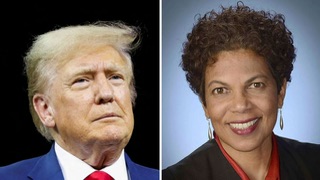
Judge Tanya Chutkan, who is overseeing the election subversion case against Donald Trump in Washington, placed a gag order on the former president after his continued attacks against potential witnesses, prosecutors and the court itself.
A Federal Court imposed a gag order on Donald Trump, made fun of his lawyers and ruled the trial will start on March 4 in D.C.
Judge Tanya Chutkan said Trump’s “presidential candidacy does not give him carte blanche to vilify … public servants who are simply doing their job. https://www.politico.com/news/2023/10/16/judge-imposes-gag-order-on-donald-trump-in-d-c-trial-00121743
He is prohibited from making public statements attacking prosecutors, court staff and potential trial witnesses. The AP reports that Donald Trump says he'll appeal a narrow gag order imposed on him in his 2020 election interference case in Washington, DC.
The First Amendment protects freedom of speech. The US Constitution also protects the right to a fair trial and there is the issue.
The Sixth Amendment of the US Constitution protects the right to “a speedy and public trial by an impartial jury.” Therefore publicly sharing information about a trial can interfere with that right. What happens when the rights to free speech and to fair trials come into tension? Sometimes, a judge may issue a gag order.
But what is a gag order, exactly? Why do gag orders exist? How does a judge decide when to issue one? We answer these questions, and much more, below.
Most likely we’ve heard the term “gag order” used in connection with high-profile criminal trials.
Formally known as a non-dissemination order, a gag order is a court-imposed restriction on what information during trial or preliminary proceedings can be released to the public and what those involved in the case can say about it. Such orders often apply to everyone directly involved: lawyers, witnesses, defendants and plaintiffs. Sometimes they apply only to specific participants.
Such orders should be of concern anytime they are issued. The public and defendants have a First Amendment right and need to publicly review, critique and comment on the performance of the judicial system. This holds courts accountable and sustains public support for their operations. But that right may run up against the Sixth Amendment right guaranteeing a fair trial.
Let’s look at what gag orders do, and when they may be appropriate limits on free speech.
This sometimes aligns with the First Amendment right to access and publish information, including about criminal trials. At other times, the two amendments come into conflict, as too much publicity surrounding a case can create unfairness:
- Potential jurors could be prejudiced by statements in the media or online.
- Witnesses could be threatened or harassed and even pressured to change their testimony.
- Confidential or proprietary trade secrets might be released.
A gag order seeks to prevent public statements that could cause harm to the overall case or people involved that cannot be undone.